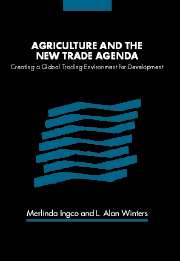Book contents
- Frontmatter
- Contents
- List of figures, tables, and boxes
- List of contributors
- Preface
- List of abbreviations
- 1 Introduction
- 2 Agriculture and the trade negotiations: a synopsis
- Part I Experience and lessons from the implementation of WTO agreements
- Part II Interests, options, and objectives in a new trade round
- Part III New trade rules and quantitative assessments of future liberalization options
- Part IV New trade issues and developing country agriculture
- 15 Sanitary and phytosanitary barriers to agricultural trade: progress, prospects, and implications for developing countries
- 16 How developing countries view the impact of sanitary and phytosanitary measures on agricultural exports
- 17 State trading in agricultural trade: options and prospects for new rules
- 18 Environmental considerations in agricultural negotiations in the new WTO round
- 19 Intellectual property rights and agriculture
- 20 Genetically modified foods, trade, and developing countries
- 21 Multifunctionality and optimal environmental policies for agriculture in an open economy
- Author index
- Subject index
17 - State trading in agricultural trade: options and prospects for new rules
Published online by Cambridge University Press: 27 February 2010
- Frontmatter
- Contents
- List of figures, tables, and boxes
- List of contributors
- Preface
- List of abbreviations
- 1 Introduction
- 2 Agriculture and the trade negotiations: a synopsis
- Part I Experience and lessons from the implementation of WTO agreements
- Part II Interests, options, and objectives in a new trade round
- Part III New trade rules and quantitative assessments of future liberalization options
- Part IV New trade issues and developing country agriculture
- 15 Sanitary and phytosanitary barriers to agricultural trade: progress, prospects, and implications for developing countries
- 16 How developing countries view the impact of sanitary and phytosanitary measures on agricultural exports
- 17 State trading in agricultural trade: options and prospects for new rules
- 18 Environmental considerations in agricultural negotiations in the new WTO round
- 19 Intellectual property rights and agriculture
- 20 Genetically modified foods, trade, and developing countries
- 21 Multifunctionality and optimal environmental policies for agriculture in an open economy
- Author index
- Subject index
Summary
Introduction
Many countries have established specialized state agencies and marketing organizations that intervene – directly and indirectly – in agricultural trade. These activities are designed to enhance food security, stabilize prices, develop agricultural industries, and protect the domestic market.
Agricultural State-Trading Enterprises (STEs) range from marketing boards with monopoly control over all supplies, through exclusive import or export agencies, to parastatal organizations with specific powers to intervene in domestic and foreign markets. These entities exercise complete or partial control over domestic and international trade in one or more products, and may perform many other functions. They exist in all types of economies and in both large and small nations.
The majority of STEs operate in the agricultural sector, most often in grains, dairy, and sugar products – important components of many national diets. For example, STE-importing countries accounted for one-third to one-half of wheat imports from 1994 to 1997, and an even higher proportion of wheat exports during that period. STEs also manage about half of rice exports and nearly a third of all rice imports. State trading is also used for meats, fruits and vegetables, and poultry and eggs, but for these commodities, protecting domestic markets, managing imports, and promoting exports is likely to be more important than ensuring food security. State trading in alcohol, spirits, and tobacco primarily serves to meet countries' fiscal and market-organization goals.
The purposes and operations of STEs differ significantly between developed and developing countries.
- Type
- Chapter
- Information
- Agriculture and the New Trade AgendaCreating a Global Trading Environment for Development, pp. 376 - 385Publisher: Cambridge University PressPrint publication year: 2004

